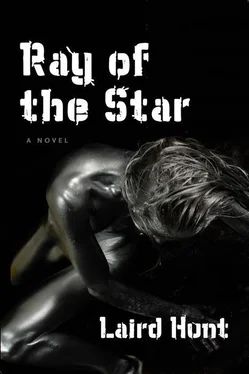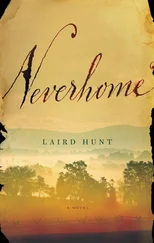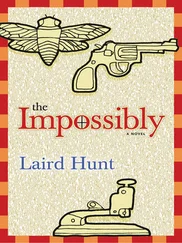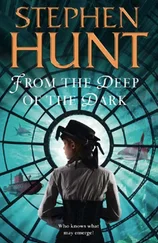“Drippings,” Harry said,
“Yes, well it’s rather unfortunate isn’t it,” Señor Rubinski said, “but when one has been on the other side, as it were, well, then it makes more sense, much more sense, I can’t tell you, my dear Harry, just exactly how much good sense it makes, especially when you have seen the hangers, all of them, and what covers the floors, they must reconstitute themselves, the drippings, because there is so much of them on the floors, it was quite slippery, but I’m wandering, this was happening earlier with my wife, I’m afraid I gave her quite a turn talking about those floors, but it’s a different matter once you’ve seen them, once you’ve been there, and know you must go back, I was lying here in my bath, greatly enjoying it when I fell asleep and was there again, and it was not a dream, no I don’t think so, and when I woke there you were, I must have dozed for some time if my wife thought to get you, but you don’t look well,”
“Don’t I?” said Harry, who now wished very much indeed that he had managed to keep his lips and mind pinched shut, that he had put them in a vice and cranked it as tightly as it would go, and that he had shut his eyes and hadn’t stared at Señor Rubinski, sitting there in his drippings, with one arm lolling over the side of the tub, “Drippings,” Harry said again and found it quite curious that he didn’t feel sick, that, unlike his reaction to Alfonso’s story about Solange, he felt no need to excuse himself and lean over the sink and retch, or run out of the Rubinski’s apartment, up to his own apartment and retch, to run out onto the street and retch, to run down the streets screaming and retching, to smash his head with a piece of brick and retch,
“Whose drippings were hanging on those hangers?” Harry said quietly, not needing to retch,
“I don’t know, I thought you might,” Señor Rubinski said,
“Well, I don’t,” said Harry, adding, “And I’m afraid that now, since I can see that you are all right, I’ll have to go,”
“All right,” said Señor Rubinski, “Yes, I suppose I am all right, yes, I suppose I am,” whereupon Harry stood, and as he did it appeared to him that all there was to Señor Rubinski was what could be seen above the surface of the water, that there was nothing below — his lower drippings had deserted him,
“Good-bye,” Harry said,
“I hope I’ve been helpful,” Señor Rubinski said,
“Yes, quite, thank you, best of luck,” Harry said, then stepped out of the bathroom, shut the door behind him, walked back down the long hallway and into the living room where he saw Señora Rubinski, asleep in an enormous green armchair pushed up close to the red couch, holding a damp, mauve handkerchief between two curled fingers, looking unnervingly like certain representations of martyred and jaundiced saints painted on one altarpiece after another during a particularly grim decade of the Northern Renaissance into which, during the early days of his despair, Harry had done no small amount of research, then, having decided not to attempt to disturb the image before him to make his report, that the drippings in the bathroom would find their way out to see the image if they wanted to, he went out the Rubinski’s door, down the stairs, and into the warm sunlight, which gave a pleasant glow to the cobbled street, despite the presence, everywhere Harry looked, of so much wind-strewn debris.
Significant weather events have the effect of accelerating the natural redistribution of the contents of cities, and even more so aseasonal events that play themselves out in population centers already so thoroughly given over to casually disseminating natural and artificial ephemera, so it was that first Solange and then Ireneo found themselves negotiating swirls and crescents of heavy sand and crushed palm frond blown half a mile inland, a suite of antique iron sconce lamps snapped off their rusting hinges, clouds of green glass, pieces of pastel-colored Styrofoam escaped, along with a packing order that ended up far out to sea, from a box swept off an oversized window ledge jutting from one of the many decrepit buildings perched in a crooked line along the city’s eastern border, and seemingly endless sheets of brightly colored newspaper, including several aged blue sheets of a commemorative sports edition of one of the larger dailies, printed twenty-five years ago, lying in a puddle of glass, perhaps torn from the wall of a café that had left its doors open, Ireneo thought as he stepped past and wished for the 100th time since he had thrown them over the cliff that he had his running shoes back or at the very least something sturdier than these cheap espadrilles, which were comfortable enough for an afternoon at the beach, but not for the sort of mileage he had put on them as he wandered the frigid streets in his damp shirt, dealing with what Doña Eulalia had told him would feel and had felt much like a withdrawal — she had experienced it herself and for a period of some hours while it was occurring had had her husband strap her to the bed so that she wouldn’t be tempted to attempt to retrieve her own treacherous shoes from the furnace or try to throw herself in after them, it was awful, she had said, noting that on top of his experience with the shoes, he had had another fright, had seen something, a speculation that Ireneo had neither contradicted nor affirmed, though he had let out a bit of a whistle that had made Doña Eulalia raise an eyebrow and say, “Ah,” which is exactly what Ireneo had said when those three, as he had spent the night referring to the connoisseurs, had a few minutes before offered to employ him, had told him that a certain guy had let them down and that they had need of someone who knew the city and had experience in what they called stuff, and that if he was interested in what would be a strictly part-time gig, one that wouldn’t conflict with his other obligations, he could start right this second by following the angel, who was at this very moment standing outside the building on the street thinking about making a getaway that would sooner or later take her and consequently Ireneo to Harry, and when he, Ireneo, had found Harry, he could tell him to come and see them in this building, second floor, door on the right, and he would have fulfilled his first task,
“Interested?” one of them said,
“Ah,” Ireneo said, but standing there with them was like standing, so the image came to him, in the center of one of those medieval maidens whose spiked doors would at any moment snap shut around him, and when one of them lifted his arm to scratch something on his face, Ireneo did something he hadn’t done very much of during his life, which is to say that he cringed, and they said,
“Good,”
and Ireneo,
“All right,” and he left the courtyard where they had been standing and without great enthusiasm began to follow the angel, who by the by seemed to him rather small and pretty as she hurried along, looking in the sudden waves of sunlight extraordinarily unbroken, thoroughly, even from his vantage point, unlike she had when he had first seen her sitting in the wake of her own melancholy at the café—an observation that caused him to reflect, salubriously, on human resilience — and as he looked at her he sped up, at very nearly the same time that, the sense of urgency surrounding her rapid forward propagation having diminished, she slowed down, so that before very long — a few paces after Ireneo had stepped over the blue sports pages in fact — he cleared his throat and came up alongside Solange, who jumped a little, then shrugged, then smiled, and so they found themselves walking next to each other, with neither one, in the instance, too terribly surprised,
“I’m supposed to follow you,” said Ireneo,
Читать дальше












